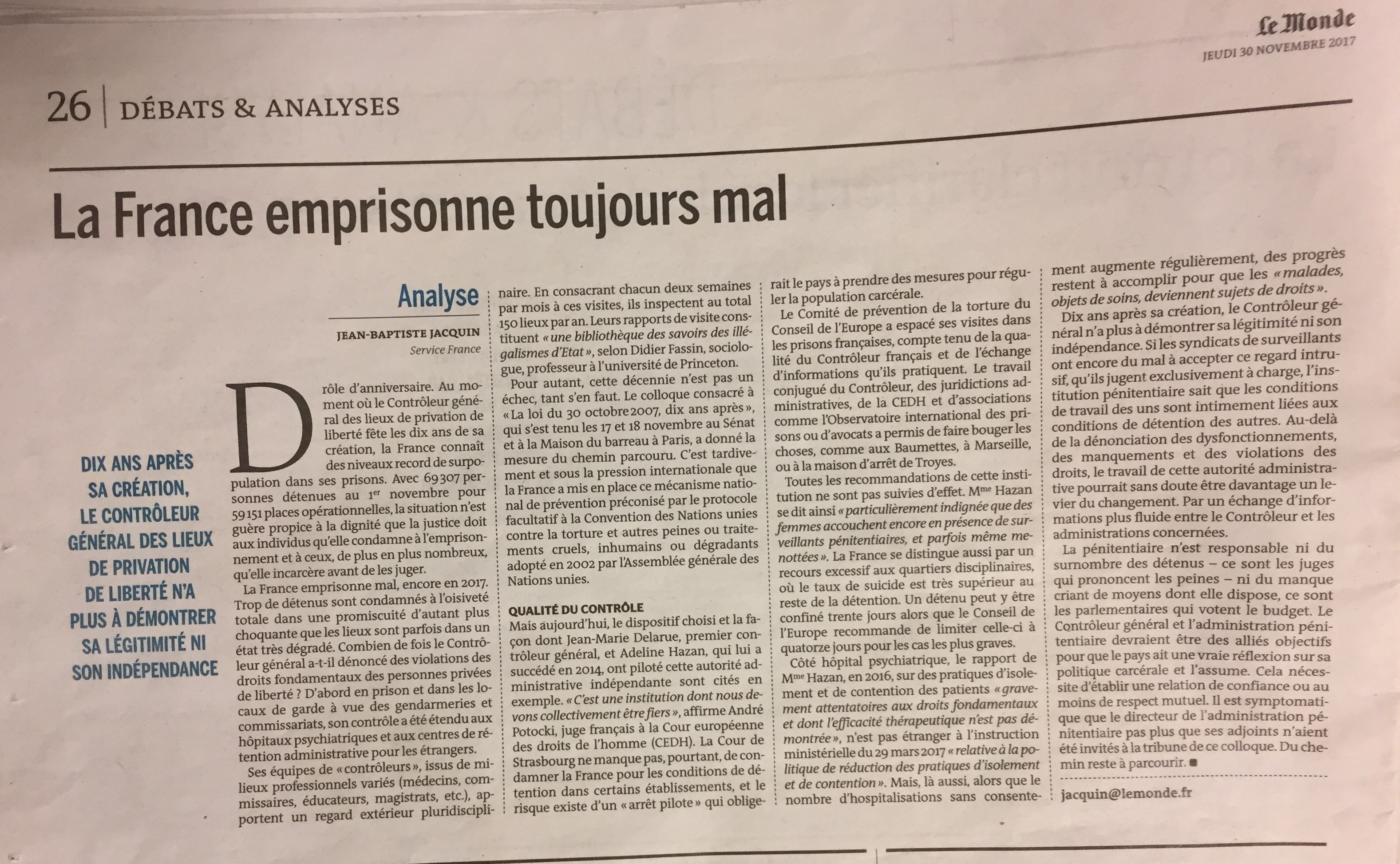Ten years after its creation, the Controller-General for Places of Deprivation of Liberty no longer has to demonstrate its legitimacy and independence.
Jean-Baptiste Jacquin for Le Monde
Strange birthday. While the Controller-General for Places of Deprivation of Liberty celebrates his first ten years, France’s overcrowding prisons hit a new record. With 69.307 people locked up as of November 1, in 59.151 regulatory places, the situation is far from the idea of dignity that justice is meant to recognize to all individuals sentenced to imprisonment and to those who, increasingly, are imprisoned before even being judged.
France imprisons badly, in 2017. Too many prisoners are condemned to spend their time in idleness in a promiscuity, shocking as the fact that the places of detention present a very degraded state. How many times has the Controller-General denounced violations of fundamental rights suffered by persons deprived of their liberty? Initially set up for prisons, custody areas of the gendarmerie and police stations, control was then extended to psychiatric wards and to administrative detention centers for foreigners.
The team of “controllers”, made up of professionals from different backgrounds (doctors, commissioners, educators, magistrates, etc.), offers an external multidisciplinary look. By consacrating two weeks a month to these visits, they inspect a total of 150 places of detention each year. According to Didier Fassin, sociologist, professor at the University of Princeton, their reports drawn constitute “a library of knowledge of the illegalities of the state”.
This decade is not a failure, so far. The conference “The law of 30 October 2007, ten years later”, held on 17 and 18 November in the Senate and at the Order of Lawyers in Paris, showed the progress made. It was not long ago and under international pressure that France created the national prevention mechanism estaclished by the Optional Protocol to the UN Convention against Torture and other cruel, inhuman or degrading treatments or punishments, adopted in 2002 by the General Assembly of United Nations.
Today, the mechanism chosen and the way in which Jean-Marie Delarue, the first Controller-General, and Adeline Hazan, who succeeded him in 2014, have guided this independent administrative authority are considered an example. “It’s an institution that we all have to be proud of” says André Potocki, French judge of the European Court of Human Rights (ECHR). However, the Court of Strasbourg condemns France for the conditions of detention of some institutes and there is the risk of a “pilot sentence” that will force the country to take measures to regulate the prison population.
The Council of Europe’s Committee for the Prevention of Torture has reduced visits to French prisons, given the quality of the Controller and the information exchanged. The joint work of the Controller, administrative jurisdictions, the ECHR and associations such as the International Prison Observatory or lawyers has proven useful in Baumettes, in Marseilles, or at the prison of Troyes.
Not all the recommendations of this institution, however, produce results. Adeline Hazan said she was “particularly appalled by the fact that women still give birth in the presence of police officers, sometimes even handcuffed”. France also stands out for its excessive use of temporary isolation, where the suicide rate is much higher than in other sections. An inmate can be confined to a maximum of thirty days despite the Council of Europe recommending to limit it to fourteen for the most serious cases.
In respect of psychiatric wards, the 2016 report by Mrs Hazan on isolation and restraint of patients “that seriously affect fundamental rights and whose therapeutic efficacy has not been demonstrated”, is not unrelated to the ministerial circular of 29 March 2017 “concerning the policy of reducing isolation and containment practices”. Yet even there, while the number of admissions without consent increases steadily, progress remains to be made so that “the patients, object of care, become subjects with rights”.
Ten years after its creation, the Controller-General no longer has to demonstrate its legitimacy and independence. If police unions can hardly accept this intrusive control, the penitentiary administration knows that the working conditions of the police are intimately linked to the conditions of detainees. Beyond the reporting of deficiencies and rights violations, the work of this administrative authority could undoubtedly be a lever for change. For a better exchange of information between the Controller and the administrations concerned.
The penitentiary is not responsible for prison overcrowding – it is the judges who pronounce penalties – nor the obvious lack of means available to them, it is parliamentarians who vote the budget. The Controller-General and the Prison Administration should be allies for the country to make an effort on prison policy. In order to do that it is necessary to establish a relationship of trust or at least mutual respect. It is telling that neither the director of the Prison Administration nor his collaborators were invited to this conference. Much remains to be done.
Translation by Ilaria Saltarelli

